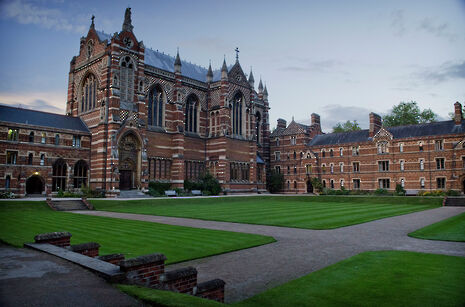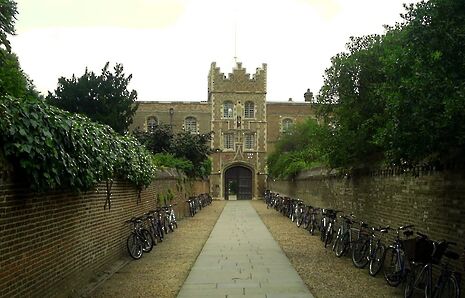The Oxbridge obsession
Sam Matthew gets to grips with the British media’s fixation on Oxbridge
The British press carefully perpetuates a caricature of modern Oxford and Cambridge. It is a dives in omnia world awash with floppy posh hair, tweed and bright red trousers. This depiction is not just inaccurate; it is damaging. The decision of certain sections of the press to continue to represent Oxford and Cambridge in this way speaks of the personal agenda of certain editors, and of a journalistic culture in which news requires scandal.

In a time of rising concerns over social mobility and a widening gap between rich and poor, the term “Oxbridge” is increasingly associated with the privileged, wealthy and entitled elite it has produced. The Guardian has a dedicated “Oxbridge and Elitism” column. The cabinet and shadow cabinet are lambasted for being filled with “Oxbridge types” (69 per cent and 47 per cent respectively). Interviews with noted graduates rarely pass without a reference to their alma mater. However, equating the Universities’ socially exclusive alumni with today’s institutions is a false parallel.
Over the past thirty years, both institutions have undergone changes. They are more open to applicants from a wide variety of backgrounds than ever before. 63 per cent of entrants at Cambridge and 58 per cent of entrants at Oxford are state educated.
Cambridge runs a £2.7 million a year outreach program to attract students from non-traditional backgrounds. Cambridge and Oxford still admit a disproportionate number of privileged students. However, this is as much the result of variation in the quality of education at secondary level, as it is a policy of discrimination by the Universities.

Although incidents of Brideshead Revisited caricature still occur, they are in the minority. ‑The Oxford Bullingdon Club’s 2011 trip to Africa saw a group of 12 students, drinking champagne in a private jet before Sand Grouse shooting in the South African veldt. The trip harked back to an age in which masculinity, birth and wealth determined success.
However, the Bullingdon club only speaks for 12 of Oxford’s nearly 12,000 undergraduate students. Most students are not privileged and are not members of drinking societies. Their credibility is undermined.
The misrepresentation of Oxbridge damages the perception of higher education in Britain. Thanks to the scale of the coverage, the social and academic prestige of other good universities is diminished in the eyes of employers and students. ‑The terms “Russell Group” and “Golden Triangle” (comprised of Oxford, Cambridge, UCL and Imperial) have half the number of online hits as “Oxbridge”. This is unfair as Oxbridge’s academic dominance is no longer assured. In the latest influential QS World university rankings, Oxford came 6th, below both UCL (5th) and Imperial (4th) (Cambridge was 3rd).

Inside the institutions, continual negative reporting devalues the achievements of the students. For the privileged there exists a sense they have not deserved their place. For everyone else they are just another tick in the box for the government’s quotas. Some students respond by emphasizing their deprived roots. Others play up their privilege.
The misrepresentation of both the University and the student body becomes a self-fulfilling prophecy. On the one hand, the perception of the Universities’ students as elitist toffs deters capable students from applying.
According to the Sutton Trust, fewer than half of secondary state school teachers would advise bright pupils to apply to Oxbridge and Cambridge. ‑They fear their pupils would not be welcome. On the other hand, the coverage encourages those who live up to the caricatured image. As long as the press perpetuates this image of Oxbridge, it will strengthen the very barriers to social mobility it claims to revile.
Oxbridge’s exceptionally negative coverage can largely be explained by the press’s antiestablishment race to the bottom. Rupert Murdoch’s News Corporation (owner of The Sun and The Times) and The Daily Mail, under editor Paul Dacre, have prospered relative to their more traditional rivals by taking a more critical and sensationalist line against traditional institutions. While such an approach has merits, Oxford and Cambridge, as figureheads of the establishment, make for irresistible targets to create content to fill a paper on slow news days.
 News / Caius mourns its tree-mendous loss23 December 2025
News / Caius mourns its tree-mendous loss23 December 2025 Comment / Yes, I’m brown – but I have more important things to say22 December 2025
Comment / Yes, I’m brown – but I have more important things to say22 December 2025 News / Clare Hall spent over £500k opposing busway 24 December 2025
News / Clare Hall spent over £500k opposing busway 24 December 2025 Interviews / Politics, your own way: Tilly Middlehurst on speaking out21 December 2025
Interviews / Politics, your own way: Tilly Middlehurst on speaking out21 December 2025 News / King appoints Peterhouse chaplain to Westminster Abbey22 December 2025
News / King appoints Peterhouse chaplain to Westminster Abbey22 December 2025








